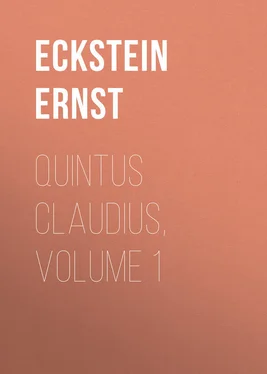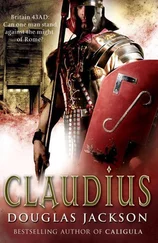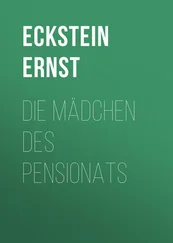Ernst Eckstein - Quintus Claudius, Volume 1
Здесь есть возможность читать онлайн «Ernst Eckstein - Quintus Claudius, Volume 1» — ознакомительный отрывок электронной книги совершенно бесплатно, а после прочтения отрывка купить полную версию. В некоторых случаях можно слушать аудио, скачать через торрент в формате fb2 и присутствует краткое содержание. Жанр: foreign_antique, foreign_prose, на английском языке. Описание произведения, (предисловие) а так же отзывы посетителей доступны на портале библиотеки ЛибКат.
- Название:Quintus Claudius, Volume 1
- Автор:
- Жанр:
- Год:неизвестен
- ISBN:нет данных
- Рейтинг книги:4 / 5. Голосов: 1
-
Избранное:Добавить в избранное
- Отзывы:
-
Ваша оценка:
- 80
- 1
- 2
- 3
- 4
- 5
Quintus Claudius, Volume 1: краткое содержание, описание и аннотация
Предлагаем к чтению аннотацию, описание, краткое содержание или предисловие (зависит от того, что написал сам автор книги «Quintus Claudius, Volume 1»). Если вы не нашли необходимую информацию о книге — напишите в комментариях, мы постараемся отыскать её.
Quintus Claudius, Volume 1 — читать онлайн ознакомительный отрывок
Ниже представлен текст книги, разбитый по страницам. Система сохранения места последней прочитанной страницы, позволяет с удобством читать онлайн бесплатно книгу «Quintus Claudius, Volume 1», без необходимости каждый раз заново искать на чём Вы остановились. Поставьте закладку, и сможете в любой момент перейти на страницу, на которой закончили чтение.
Интервал:
Закладка:
This quotation from Catullus, the favorite poet and model of the epigrammatist, did not fail of its point, for every one, with the single exception of the blushing Aurelius, was reminded by it that Ravidus was, in that passage, called a “crazed and witless wretch.”
“It was I,” said Aurelius coolly. “But it was not your verse that I criticised, but … however, you heard. If a woman is no more to you than the beetle, the snake that wriggles in the dust, I can but pity your experience.”
“Yours then has been more fortunate?” laughed Martial.
“I should hope so, indeed!”
Lycoris, who, though at some distance, must have heard every word, was chatting vehemently with Stephanus, her neighbor on her left, who kept his gaze alert, though with an air of reserve and dignity. Two of her companions, pretty but by no means maidenly personages, stared contemptuously at Aurelius as if to say: “Well, what a booby!”
“Here is to your health, worthy Cato of the North!” cried Martial mockingly. “Reveal his name to me, O Muse! and I will dedicate to you five and twenty epigrams on his virtue.”
“He has a sharp muzzle,” muttered Norbanus to Aurelius. “You will get the worst of it.”
“No doubt of that,” said Aurelius. “Fencing with words was never my strong ground.”
“Just my case; and I cannot stand his accursed ribaldry. These fellows are like eels, it is impossible to hold them. It is the city tone, my dear friend! Our Stephanus now – only see how the man is made up – now, full in the light. By Castor! he is touched up and painted like a wench – Stephanus again, is a master in the war of words. But he gives you a pebble for a gem; everything about him is false, even his hair. But beware of him; he will try to make mince-meat of you.”
“I say, Martial,” said a harsh voice: “Who is going to publish the epigrams you gave us to-day?”
“I do not yet know. Possibly Tryphon." 160 160 Tryphon, (Lupercus). The episode described here, which seems almost like a satirical allusion to the present time, is only one of Martial’s epigrams transposed into action. (Mart. Ep. I, 117.) “As oft, Sir Tradewell, as we meet, You’re sure to ask me in the street, When you shall send your boy to me, To fetch my book of poetry? etc.” Oldham. The bookseller Atrectus, who had a shop on the Argiletum, a public square not far from the Forum Caesaris, is also mentioned. – Traces of a well-organized book-trade are found towards the end of the republic. The first publisher on a larger scale is Pomponius Atticus, a friend of Cicero, who formally issued a series of Cicero’s works, for instance the Orator, Quaestiones Academicae, etc., and not only distributed them to the different bookstores in Rome, but supplied the numerous shops in Greece and Asia Minor. (See Cic. ad. Att. XII, 6, XV, 13, XVI, 5.) Yet Atticus was a patron of literature and an aesthetic, rather than a business man. The best-known booksellers and publishers under the emperors were: the Brothers Sosii, who issued the works of Horatius Flaccus (Hor. Ep. I, 20, 2, Ars. poet. 345); Dorus, the Phillip Reclam junior of ancient times, who in the reign of Nero introduced cheap popular editions of Livy and Cicero, (Sen. Benef. VII, 61) and Martial’s publisher, the Tryphon mentioned in this story. (Mart. Ep. IV, 72, XIII, 13.) The editions were provided by slaves, who wrote from dictation. The books were delivered in covers, the backs, glued together, being fastened in the hollow of a cylinder, through which ran a revolving stick. The volumes were cut, the edges were dyed sometimes black and sometimes purple. (See Göll: “ Book-trade of the Greeks and Romans ,” Schleiz., 1865.) Pollio Valerianus published Martial’s early poems. (Mart. Ep. I, 113, 5.)
“And when, my friend?”
“Well, in the course of the month.”
“So soon? Listen, when the book comes out, may I send to you to borrow a copy?”
“You are too kind, my dear Lupercus; but why should you give yourself and a slave so much trouble? I live quite high up on the Quirinal. 161 161 Quirinal. Martial’s house was near the temple on the Quirinal. (Mart. Ep. X, 58.)
You can get what you want much nearer to you. You pass every day by the Argiletum. There you will find a very interesting shop, exactly opposite the Forum of Caesar. Atrectus, the bookseller, will feel himself honored in selecting a beautiful copy for you – almost given away too, as I may say, for with purple letters and smoothly pumiced it costs but five or six denarii." 162 162 Denarii. At the time of Domitian, the denarius (10 as ,) was worth about 15 cents.
“Six denarii!” exclaimed Lupercus. “That is too dear for me. I have to be saving with my money.”
“And I must be saving with my books.”
“It is not every one, who knows how to be obliging!”
“Nay, do not give up all hope,” retorted the epigrammatist scornfully. “Make your wants known at all the street-corners, 163 163 Street-corners. Large square tablets, whitened, for the display of public notices, stood at the corners of the streets. A tablet of this description was called album, (albus-white).
and perhaps some costermonger 164 164 Costermonger. Boiled chick-peas were publicly carried about for sale. (Martial Ep. I, 41, I, 103.)
will lend you a copy.”
“Why is Martial so hard upon him?” asked Aurelius of the praetorian guardsman. “This Lupercus seems to be in narrow circumstances.”
“Ha, ha!” laughed Norbanus. “With an income of two hundred thousand sesterces…”
“Impossible! how can a man be at once so rich and so mean?”
“You are in Rome, Aurelius – do not forget that you are in Rome. Here extremes meet; here everything is possible, even the impossible.”
It was now growing dusk, and in a few minutes hundreds of costly bronze lamps were lighted, some hanging in candelabra from the ceiling, some elegantly arranged round the pilasters and columns. Indeed it was not till this moment, that the banquet really assumed the aspect intended by the artistic and extravagant imagination of the hostess. The beaten silver of the massive bowls 165 165 Massive bowls. The crater ( crater or cratera ) was a large vase or bowl, in which strong wine was mixed with water. A ladle was used to fill the drinking-cups.
and platters gleamed brightly under the wreaths of flowers and garlands of foliage, while the huge wine-jars and costly Murrhine vases, 166 166 Murrhine vases, ( murrhina vasa ). Vases made of murrha , a material with a pale sheen in it, highly valued by the ancients; probably fluor-spar.
the jovial and purpled faces of the guests, the splendid dresses, the pearls and gems – all were doubly effective under the artificial light.
One costly delicacy was followed by another; all the productions of the remotest ends of the earth met at the banquet of Lycoris. Fish from the Atlantic ocean, Muraenae from Lake Lucrinus, Guinea-fowls from Numidia, 167 167 Guinea-fowls from Numidia, ( aves Numidicae or merely Numidicae ) were a favorite dish. (Plin., Hist. Nat. Mart. etc.)
young kids from the province of Thesprotis 168 168 The province of Thesprotis in Epirus, extended from Chaonia to the Ambracian Gulf. The goats raised there were considered exceptionally good.
in Epirus, pheasants from the Caspian Sea, 169 169 Pheasants from the Caspian Sea. At the time of our story, these birds were a newly-introduced delicacy. Phasis was the name of the boundary river between Asia-Minor and Colchis; hence their name phasianus ; ( avis Phasiana , or merely Phasiana , or Phasianus – the pheasant.) Martial also calls them volucres Phasides .
Egyptian dates, 170 170 Dates. The best quality were imported into Rome from Egypt.
dainty cakes 171 171 Dainty Cakes. Bread from Picenum is mentioned in the menu of a banquet given in the latter half of the century B. C., (Marquardt Handbuch, IV, 1.)
from Picenum, figs from Chios, 172 172 Figs from Chios. Varro, ( R. Rust. I, 41) speaks of Chian, Lydian, Chalcedonian and African figs.
pistachio nuts 173 173 Pistachio nuts. The best pistachio nuts came from Palestine and Syria, whence Lucius Vitellius introduced them into his garden at Albanum.
from Palestine – were all here of the choicest quality and elaborately prepared. Euphemus, 174 174 Euphemus. Caesar’s head-cook or butler. (See Martial Ep. IV. 8.) “The tenth hour’s proper for my book and me, And Euphem, thou who dost the board o’ersee.” Anon, 1695.
Caesar’s own head-cook, could have done no more. Nor could anything be more perfect, than the grace with which the handsomely-dressed slaves offered each dainty on long slices of bread. After each dish had gone round, little boys with wings brought in magnificent onyx jars filled with perfumed water, which they poured over the hands of the guests. The long flowing hair of a female slave 175 175 The long flowing hair of a female slave. This fancy was not at all unusual. (See Petron. , 27.)
served to dry them, in the place of the more usual linen or asbestos napkin. In such trifles as these Lycoris loved to be original.
Интервал:
Закладка:
Похожие книги на «Quintus Claudius, Volume 1»
Представляем Вашему вниманию похожие книги на «Quintus Claudius, Volume 1» списком для выбора. Мы отобрали схожую по названию и смыслу литературу в надежде предоставить читателям больше вариантов отыскать новые, интересные, ещё непрочитанные произведения.
Обсуждение, отзывы о книге «Quintus Claudius, Volume 1» и просто собственные мнения читателей. Оставьте ваши комментарии, напишите, что Вы думаете о произведении, его смысле или главных героях. Укажите что конкретно понравилось, а что нет, и почему Вы так считаете.












